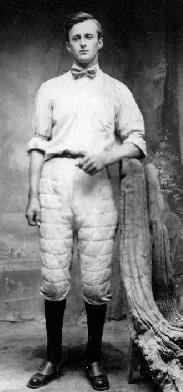 The
Baseball Player
The
Baseball Player
by Eric Mayer
When I read about the coming layoffs, I couldn't help thinking about my grandfather. It was from him I derived my unfashionable distaste for those people who make a living off the work of others and then discard them.It wasn't anything my grandfather said. He wasn't much of a talker. A self effacing man, his only vanity was the battered gray hat he wore perpetually to hide his bald spot.
He was born on a farm and left school in the seventh grade. In his youth he played baseball. Once he faced the barnstorming Yankees as one of two locals on an all star squad that included Pepper Martin. He never talked about those days. I heard it from my Dad and my Uncle.
"Best pitcher I ever saw," my uncle told me. "And the best fighter too. Back then there was a brawl after every game. We played some tough crews, but Charlie never lost a fight."
When his ball-playing days were over and the family left the farm, he married and moved to what had once been a summer cottage, nearer to town. He took as much of the farm with him as he could. Using a wagon and a team of horses, he hauled rocks from the fields to build a wall, walkways and a rock garden, where, as a child, I was amazed at the "hens and chickens" growing from the stones.
He brought apple and pear trees from the orchards and since there wasn't as much room as on the farm, he grafted them so that each tree bore two or three different kinds of fruit.
He also went to work for "the Judge". For thirty years, for 25 cents an hour, he tended the judge's flower gardens, then took the bus home to tend his own.
I've seen old photographs of him, in his hat, standing in front of massed peonies, hollyhocks and snapdragons faded like hand tinted postcards. When I was a child only remnants remained, a few rutted paths between beds of phlox .
By all accounts my grandfather was generous with his talents. He supplied half the neighborhood with vegetables from his garden. No small thing during the Depression. Years later, an old neighbor pointed out to me the towering row of pines along the edge of his property."Look at that windbreak - your granddad planted that for me."
The Judge was a staunch Republican. He couldn't abide Roosevelt's giveaways and never enrolled my grandfather in the social security program. So it was, that when he left the Judge's employ, in his mid-sixties, my grandfather went to work as a janitor at the telephone company office down the street in order that my grandmother would qualify for benefits, so that she would not have to give up their home.
I was in grade school and thought it was the best job anybody's grandfather could have. After business hours, he let me into the big, deserted, brick building and led me through offices in the dim light that seeped through closed venetian blinds. He bought chocolate milk for me in the cafeteria and then allowed me to peek into the Board Room.
"Better be quick," he admonished, and I'd duck back, away from the angry stares of the oil painted owners on the paneled walls.
Best of all was the switchboard where Mabel, the night operator, let me take over and perform what then seemed technological miracles, like placing three way calls to astounded playmates.
 "But watch out," said
my grandfather, pointing to a socket next to a red light. "Don't plug into
that 'un. That's the boss's home phone."
"But watch out," said
my grandfather, pointing to a socket next to a red light. "Don't plug into
that 'un. That's the boss's home phone."
The chilling realization that a slip of my hand might bring us to the attention one of those baleful faces from the Board Room made the game all the more exciting. My grandfather managed to stay on the job for the required time. It was a hard struggle.
During that time he climbed a ladder to get to the fat, Bartlett pears that only grew in the upper branches of the pear tree, fell, and was never right afterwards. Towards the end, I would see him limping home, half crippled by arthritis and an ulcerated leg that never healed.
My parents urged him to collect unemployment. He had a right, they said.But he was too proud.
"I oughtn't tell anyone I'm looking for work," said my grandfather. "I can't work a lick anymore." He took off his hat then and didn't put it back on.
As a kid, I was fascinated by the family legend of his ball playing. For years, his ancient catcher's mitt, perfectly round and inflexible, and his 42 inch bludgeon of a bat, sat out in the barn, next to the chicken coop - set aside but not discarded. Sometimes my friends and I would take the bat outside, though we could hardly lift it. We'd save it for when we needed a "big hit." There was something magical about a bat that had existed in the era of Babe Ruth.
As I've grown older, though, and read the latest news of business, I more often think of how he worked for the Judge, and then the phone company. And how terribly old he looked coming home at night, in the years before he died. I remember how my grandmother lived in their home, caring for their gardens, for 20 years more.
And I remember my uncle telling me, "Charlie never lost a fight."
Copyright (C) 1995 Eric Mayer